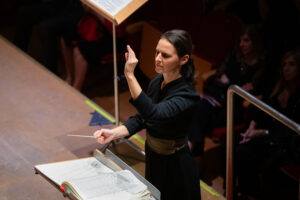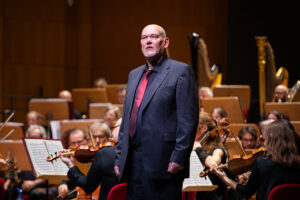It is still a difficult time for the Teatro Comunale di Bologna, at which renovation started in November 2022 and which will not open its doors until next season at the earliest. It has been a strange time for Oksana Lyniv, who appeared for the first time at the conductor’s podium of one of Italy’s most beautiful theatres in March 2021. Four months later, as the first woman in the history of the Bayreuther Festspiele, she conducted a new staging of Der fliegende Holländer at the Green Hill, before taking over as music director of the Bologna company the following January. During her three-year tenure she was able to prepare just one “real” premiere in Bologna’s Sala Bibiena. The following productions, not only those under her baton, wander from hall to hall in Emilia-Romania’s capital.
It was not without reason that the theatre closed in 2022 with a production of Wagner’s Lohengrin. This was where the Italian premiere of the opera took place in 1871. Over the following three decades Teatro Comunale presented all of Wagner’s most important works and became the first company in the world to receive official permission from the Bayreuth Festival to stage Parsifal, on 1 January 1914, under the baton of Rodolfo Ferrari, with the phenomenal Giuseppe Borgatti in the title role and Helena Rakowska – the wife of Tullio Serafin – in the role of Kundry. Bologna became the most important centre for Wagnerian performances in Italy. It was this tradition that Lyniv, the first female conductor at the helm of an Italian opera company, not just in Bologna, decided to revive.
She has carried out her reform with kid gloves, seemingly without neglecting the repertoire beloved by the local audiences. However, she has handed this repertoire over to other conductors, focusing herself on music opening up other horizons – on Wagner’s operas, on the late Romantic idiom of Mahler and Strauss, on Puccini’s last works. I encountered the Bologna Holländer under her baton in 2023, still having vivid memories of the Bayreuth performance. My impression at that time was that Lyniv was still struggling with the local orchestra, which stubbornly played in the Verdian style, in a manner unsuited to any of Wagner’s scores. That is why I initially was reluctant to face the concert performance of Der Ring des Nibelungen, presented in Bologna in stages since June last year. I gave in only when it came to Siegfried, which in the end I did not manage to see. It was, therefore, with even greater determination that I went to see and hear Götterdämmerung – especially after my recent, very positive experience with the entire Ring cycle conducted by Simone Young, another “debutante”, that is, the first woman to conduct the entire tetralogy in Bayreuth.
All concerts in the cycle – just eight in total, two for each part of the Ring – were held at the Teatro Manzoni, an elegant building in a style reminiscent of Liberty, a uniquely Italian variety of Art Nouveau. Although the edifice, opened in 1933, is located at the very heart of Bologna, it stands away from the main thoroughfares, amidst buildings cramped into the old town backstreets. Before the war it housed one of the most modern culture venues in Italy, with a vast orchestra pit and a very spacious auditorium. It became a venue for concerts, opera and theatre performances, as well as film screenings for thousands of people. After the war the building functioned as a cinema, undergoing extensive renovation in the early twenty-first century. The old theatre was replaced with a state-of-the art concert hall with an auditorium of just over 1200 seats.
Oksana Lyniv. Photo: Anrea Ranzi
I will not delve into the reasons for not staging the Ring in its full stage form – as was the case with Der fliegende Holländer presented over two years ago in the much larger EuropAuditorium, which has the necessary machinery at its disposal. Let me point out, however, that the full Wagner orchestra took up the entire space of the Auditorium Manzoni stage – the chorus had to be placed in the balcony (to an excellent dramatic effect, but more on that in a moment). Instead of a beautifully produced and exemplarily edited programme book that I praised so much in my review of Holländer, we got a ten-page booklet into which, apart from notes on the performers and a partly out-of-date cast, only an essay by Alberto Mattioli could be squeezed.
It is a pity that one of Lyniv’s most ambitious ideas was given such modest treatment – especially as this was both her debut in the Ring and the return of the tetralogy after more than a quarter of a century of absence from the Bologna music scene. The return was certainly successful; so much so that I began to regret my earlier prejudices. The orchestra had finally become accustomed to the idiom of this music, playing attentively and with commitment, grasping every suggestion from Lyniv, who this time not only broke down the score into its constituent parts, precisely extracting from it all the details of texture and emphasising the sophisticated interplay of leitmotifs, but also took care of the continuity and coherence of the narrative. The story moved forward unstoppably and in such a broad wave that I can forgive the winds some false notes and intonation slip-ups – surprising in that they appeared rarely, but in an accumulation that resulted in a veritable cacophony, perhaps most severe in the prelude to Act Three. Perhaps there were not enough rehearsals, or perhaps there was a lack of practice in using authentic Wagnerian instruments, including three steerhorns, or cow horns. On the other hand, the chorus, prepared by Gea Garratti Ansini, did a phenomenal job – this is true especially of the male voices in the stunning intensity of the Gibichungs’ response (from the balcony) to Hagen’s chilling Call in Act Two.
When it comes to the soloists, there was a merry-go-round in the casting of the two most important roles. Siegfried changed twice, finally entrusted to Tilmann Unger a few days before the concert. Wagner lovers became familiar with the German tenor’s name during one of last year’s Bayreuth performances of Parsifal, when Andreas Schager fell ill and his replacement Klaus Florian Vogt missed his plane, as a result of which Unger took on the title role in Act One. I advise you to pay attention to this singer: the only thing he still lacks for the role of Siegfried is a bit more volume and, thus, freedom at the upper end of the range. His voice is very handsome, with the right baritone tinge at the bottom, ringing and clear as befits a Heldentenor. His text delivery is excellent; he intelligently builds his characters and skilfully plays with the mood, as he demonstrated especially in the beautifully constructed monologue “Mime hiess ein mürrischer Zwerg” in Act Three. A perfect Siegfried for modestly-sized stages, and young enough to be able to still develop and “grow into” theatres with more difficult acoustics.
Brünnhilde was to have been played by Eva Vesin, but she was in the end replaced by Sonja Šarić, with whom Lyniv had worked since the beginning of her tenure in Bologna. I noticed the Serbian soprano’s extraordinary musicality already in Holländer, in which she sang Senta. This time she captivated me with her unique timbre – soft, velvety, a little nasal, so different from the bright, often wobbly sopranos that, for reasons I cannot fathom, have taken the lead in the Wagnerian repertoire today. In Šarić’s interpretation Brünnhilde evolved in perfect harmony with the score: from a girl in love to a mature woman who had lost everything and only then appreciated the power of love. I once sensed a similar note in the voice of my first Brünnhilde – the phenomenal, unjustly forgotten Berit Lindholm. Similar technical ease and interpretative wisdom are easier to find today in archive recordings than on the stages of renowned opera houses.
Albert Pesendorfer (Hagen). Photo: Andrea Ranzi
The Bologna Götterdämmerung had one more protagonist – the magnificent Hagen of Albert Pesendorfer, whose bass is powerful, intense and terrifyingly dark, which the singer enhanced even more with his carefully thought-out portrayal of the character and excellent acting. Of Hagen’s two unfortunate siblings I found Gutrune the more memorable by far – in Charlotte Shipley’s lyrical portrayal she was fragile, arousing compassion, and, in her reaction to Siegfried’s death, even shocking in the truth of her emotions. The otherwise lovely baritone Anton Keremidtchiev was disappointing as Gunther, singing the role almost mechanically, with his eyes fixed on the score, without any connection to the text. Just as disappointing was Atala Schöck in the role of Waltraute, sung in a voice that was tired, had too much vibrato and lacked sparkle. On the other hand, fine performances came from Claudio Otelli as Alberich as well as brilliantly marched Norns (Tamta Tarielashvili, Eleonora Filipponi, Brit-Tone Müllertz) and Rhinemaidens (Julia Tkachenko, Marina Ogii, Eglė Wyss).
If the previous parts of the Ring were as convincing as Götterdämmerung, Oksana Lyniv’s mission in Bologna can be regarded as accomplished. Teatro Comunale has returned to the Wagnerian tradition inaugurated so beautifully with Lohengrin conducted by Angelo Mariani. Lyniv has not parted company with Bologna for good – she will work closely with the local opera house at least until the Sala Bibiena reopens. I am becoming more and more taken by women conducting Wagner’s music. Lyniv is like fire. Young is like aether. Time for female incarnations of other Platonic elements in this repertoire.
Translated by: Anna Kijak


